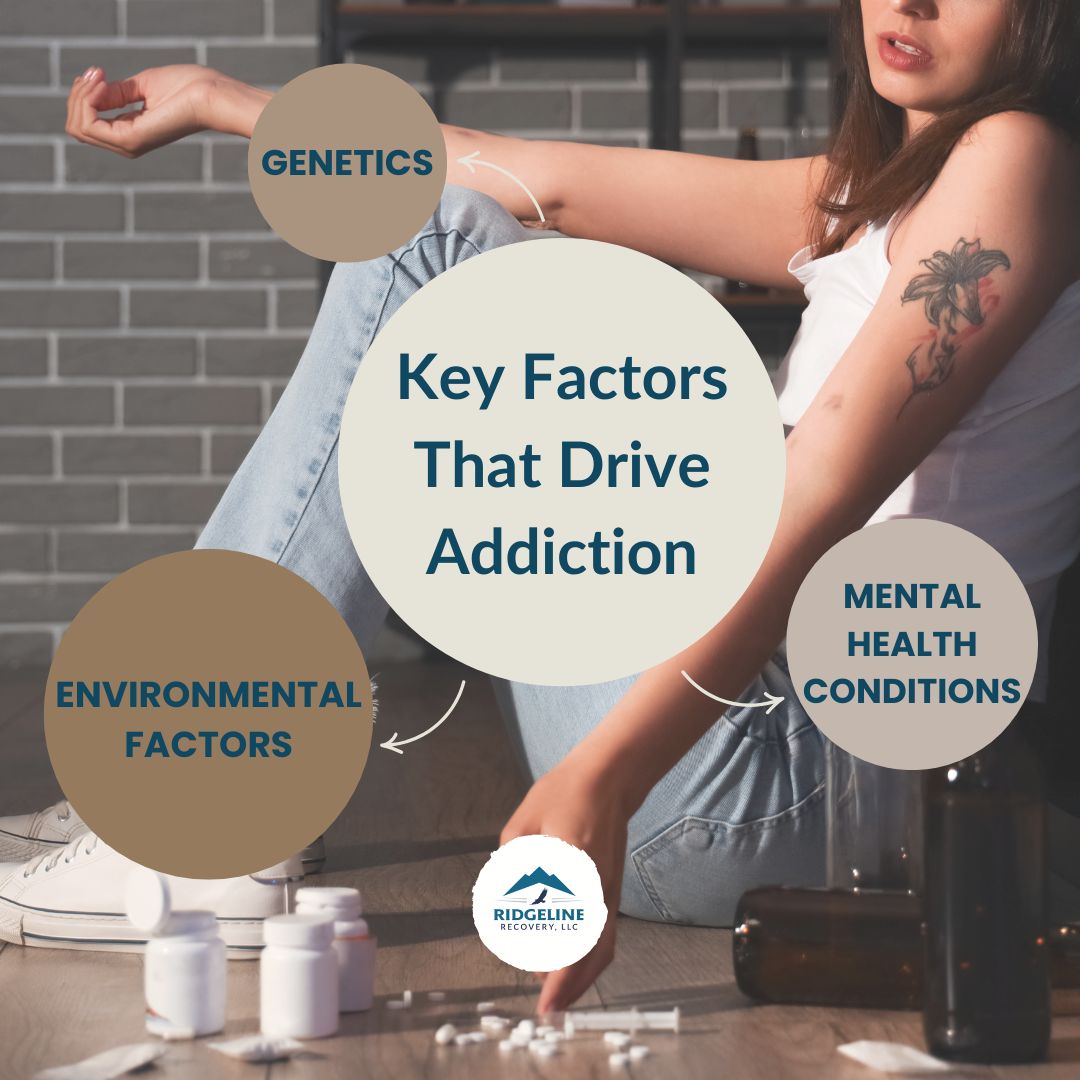Addiction isn’t just a lack of willpower. It’s a complex condition influenced by genetics, environment, and mental health. Some people are more prone to addiction due to factors beyond their control, while others develop it over time due to stress, trauma, or mental health struggles. Understanding what drives addiction can help those who struggle with it find a way to break free.
In this article, we’ll break down the key factors that contribute to addiction and how to overcome them.
What Exactly Is Addiction?
Before diving into the causes, let’s clear something up: Addiction is not a choice.
Most people don’t set out to become addicted. It often starts with a small habit—drinking socially, using painkillers after surgery, or experimenting with drugs out of curiosity. But over time, the brain rewires itself to crave the substance, making it harder to stop.
Here’s why:
- Dopamine Overload – Drugs and alcohol flood the brain with dopamine, the chemical that makes you feel pleasure. Over time, the brain stops producing dopamine naturally, making it dependent on the substance.
- Tolerance Builds Up – The more you use, the more you need to feel the same effect. This leads to higher doses and riskier behaviors.
- Withdrawal Feels Impossible – When someone stops using, withdrawal symptoms hit hard—pain, anxiety, depression, nausea—making it easier to relapse.
But why do some people get addicted while others don’t? That’s where genetics, environment, and mental health come in.

1. Genetics: The Hidden Risk Factor
If addiction runs in your family, you may have a higher risk of developing it too. Studies show that genetics account for 40% to 60% of the risk for substance use disorders (SUD).
That means addiction can be passed down, just like eye color or height. If a parent, sibling, or close relative has struggled with addiction, you might have a greater chance of developing it.
But here’s the good news: Genetics don’t guarantee addiction. They just make you more vulnerable. It’s like having a loaded gun—but your choices and environment determine whether the trigger gets pulled.
How to Fight Genetic Risk
- Know your family history. If addiction runs in your family, be extra cautious with substances.
- Build healthy habits. Exercise, meditation, and hobbies can help keep your brain’s dopamine levels balanced naturally.
- Seek early intervention. If you notice signs of addiction, getting addiction therapy early can prevent it from worsening.
2. Environmental Factors: The Power of Your Surroundings
Your environment plays a huge role in whether or not you develop an addiction. This includes:
- Peer pressure – If your friends use drugs or drink excessively, you’re more likely to do the same.
- High-stress environments – Work stress, financial struggles, or toxic relationships can push people toward substances as a way to cope.
- Trauma – Physical, emotional, or sexual abuse increases the risk of addiction. Many people turn to substances to numb the pain.
- Family exposure – Growing up in a household where substance use is normal makes it easier to fall into the same patterns.
Real-Life Example
Imagine two people:
- Person A grows up in a home where parents drink daily, and friends use drugs on weekends.
- Person B has parents who rarely drink and a support system that promotes healthy coping skills.
Who do you think is more likely to struggle with addiction?
It’s not impossible for Person B to develop an addiction, but Person A has a higher risk due to their environment.
How to Overcome Environmental Risks
- Change your surroundings. If certain people or places trigger your substance use, distance yourself.
- Find healthier coping mechanisms. Exercise, therapy, and creative outlets can replace unhealthy habits.
- Join a support system. Programs like addiction recovery help people stay accountable.
3. Mental Health Conditions: The Link Between Addiction and Mental Health
Mental health and addiction go hand in hand. People struggling with anxiety, depression, PTSD, or bipolar disorderoften use substances to self-medicate—but this only makes things worse.
For example:
- Anxiety → Someone drinks alcohol to feel calm but then relies on it every time they’re nervous.
- Depression → Someone uses stimulants (like cocaine) to feel happy, but crashes even harder after.
- PTSD → Someone uses drugs to numb trauma but ends up addicted.
Breaking the Cycle
- Seek professional help. Addiction treatment programs address both addiction and mental health issues.
- Develop coping skills. Therapy, mindfulness, and exercise can help manage mental health without substances.
- Take medication (if needed). Some people need antidepressants or anti-anxiety meds—but prescribed, not self-medicated.
The Slippery Slope: How Addiction Develops Over Time
Stage 1: Experimentation
- Trying a drug or alcohol for the first time, often out of curiosity or social pressure.
Stage 2: Regular Use
- Substance use becomes a habit—weekends, after work, or when stressed.
Stage 3: Risky Use
- Using despite negative consequences (hangovers, missed work, relationship issues).
Stage 4: Dependence
- The body needs the substance to feel “normal.” Withdrawal symptoms appear when stopping.
Stage 5: Addiction
- The substance controls life. Everything revolves around getting and using it.
If you or someone you know is in the early stages, don’t wait. Getting help now through Ridgeline Recovery can prevent addiction from taking over.
How to Break Free from Addiction
Overcoming addiction is tough, but it’s 100% possible. Here’s how:
1. Admit There’s a Problem
No more excuses. No more denial. Recognizing the problem is the first step to fixing it.
2. Seek Professional Help
Trying to quit alone is like trying to climb Mount Everest without gear. Addiction therapy provides expert guidance to make recovery easier.
3. Build a Strong Support System
Surround yourself with people who uplift you, not drag you back into bad habits.
4. Treat Underlying Mental Health Issues
If anxiety, depression, or PTSD are driving substance use, treat those first. Addiction treatment can help.
5. Create a Long-Term Plan
Recovery isn’t just about quitting—it’s about rebuilding a better life.
Remember: You’re Not Alone
Addiction is influenced by genetics, environment, and mental health, but it doesn’t define you. No matter how bad it feels, there’s always a way out.
If you or a loved one is struggling, don’t wait. Reach out to Ridgeline Recovery today for expert support.
Need guidance? Contact Us and take the first step toward a healthier future.







